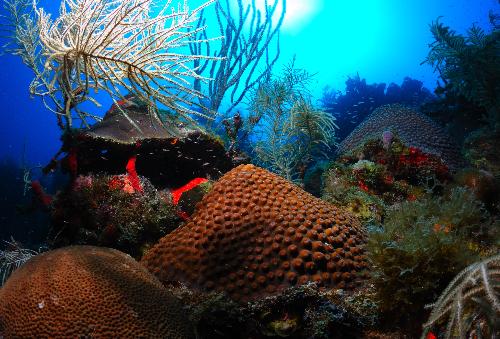Planet Earth - Studying Ocean Acidification
Interview with
Chris - Coral reefs are regarded as the rainforest of the sea. They play a vital role in marine ecosystems and now, a new reef research unit at the University of Essex in Colchester has been setup to study them and Planet Earth presenter Sue Nelson has been to meet the Assistant Director Dave Suggett, and the Director Dave Smith.
Dave Smith - We have a central large tank which acts asa whole ecosystem with corals, fish, numerous different types of organisms that make up a coral reef, and then around the outsides of the central system, we have a designated site which we use to fragment corals to grow for experiments. On the other side of the central system, smaller tanks where we can very precisely control the environmental conditions. From light levels to temperature, and in some cases water quality as well.
Sue - We're in the doorway at the moment. Let's just go inside where it's even noisier and take at closer look at this large, central, rather beautiful tank. Can you give me an idea of the range of species that you've got?
Dave Smith - Sure, yeah. It is quite noisy in here but that sort of mimics quite nicely what a coral reef is. It's a noisy, high energy environment and that's quite important for us to be able to mimic the sort of environment that we see in nature. We have about 22 different species of coral ranging from very highly branched corals to more boulder-like corals, and encrusting corals. We have soft corals which are part of the same family of the reef building corals, but don't produce the skeleton. And of course, dotted inside and within their little holes, and cubby holes of the coral itself, we have new and different species of fish. All of which play important functional roles on the reef, mopping up seaweeds and algae, and keeping the reef in check and balance.

Sue - Is this coral all from one particular region?
Dave Smith - This coral that we see at the moment, in fact, the 20 species are all from the IndoPacific region around Indonesia, the Philippines, which is actually the centre of coral biodiversity. So you find more species there than anywhere else around the world, and most of our research in the field is based out in the Indian Ocean and the Pacific. So we're mimicking a typical IndoPacific reef here.
Sue - Dave Suggett, you're especially interested in looking at the effects of ocean acidification on coral. How do you go about doing that?
Dave Suggett - Well ocean acidification is an exceedingly complex process. We're only just beginning to understand the carbon chemistry associated with that. As a term or a process, it effectively describes excess carbon dioxide from the atmosphere, entering into the oceans. Normally, oceans have a natural capacity to mop up that CO2, but with so much CO2 now coming from the atmosphere, it's exceeding this - what we called the buffering capacity of the oceans. So gradually, we're seeing a decline pH, making it less alkaline rather than more acidic for want of a better term. Why this is so important is that corals require inorganic carbon for several reasons. First of all, photosynthesis and secondly, they need carbonate ions to be able to form their hard shells which makes them so important for constructing coral reefs.
Sue - How do you go about monitoring then, how much carbon dioxide a piece of coral is taking in?
Dave Suggett - Well I think really of this as a key stone element of our research which was to try and take existing technology that's used in terrestrial systems, which can easily monitor carbon dioxide in the air and actually start to use that to monitor carbon dioxide in sea water. So in order to do that, we've taken technology from the medical industry where you have gas permeable tubes and it lets the gases permeate through them and then be measured by the terrestrial system. So this is a major step forward for us and for the first time, being able to measure carbon dioxide in sea water continuously and rapidly, alongside various other measures of the carbon chemistry. So we have a holistic view of ocean acidification. That's actually been very rare until now to do.
Sue - Dave Smith, obviously you're not going to know exactly what's going to happen until you finish your experiment but you must have a crucial idea in terms of what the differing effects of carbon dioxide are going to have on the coral.
Dave Smith - Absolutely. Coral reefs are so biodiverse and so productive because they're very physically complex. So any environmental conditions which decrease coral's ability to produce the complexity will have major consequences for the number of species a coral reef has and the half-a-billion people who depend on coral reefs for food.










Comments
Add a comment